2006 SUBARU BAJA brakes
[x] Cancel search: brakesPage 313 of 487
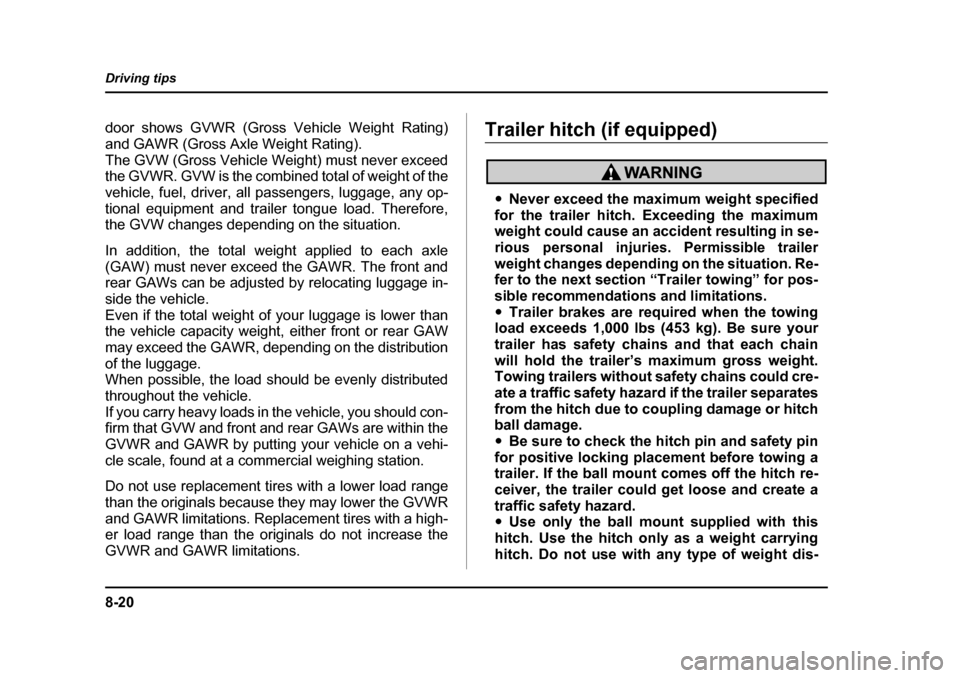
8-20
Driving tips
door shows GVWR (Gross Vehicle Weight Rating)
and GAWR (Gross Axle Weight Rating).
The GVW (Gross Vehicle Weight) must never exceed
the GVWR. GVW is the combined total of weight of the
vehicle, fuel, driver, all
passengers, luggage, any op-
tional equipment and trailer tongue load. Therefore,
the GVW changes depending on the situation.
In addition, the total weight applied to each axle
(GAW) must never exceed the GAWR. The front and
rear GAWs can be adjusted by relocating luggage in- side the vehicle.
Even if the total weight of your luggage is lower than
the vehicle capacity weight, either front or rear GAW
may exceed the GAWR, depending on the distribution
of the luggage.
When possible, the load should be evenly distributed
throughout the vehicle.
If you carry heavy loads in the vehicle, you should con-
firm that GVW and front and rear GAWs are within the
GVWR and GAWR by putting your vehicle on a vehi-
cle scale, found at a commercial weighing station.
Do not use replacement tires with a lower load range
than the originals because they may lower the GVWR
and GAWR limitations. Replacement tires with a high-
er load range than the originals do not increase the
GVWR and GAWR limitations.Trailer hitch (if equipped)
�y Never exceed the maximum weight specified
for the trailer hitch. Exceeding the maximum
weight could cause an accident resulting in se-
rious personal injuries. Permissible trailer
weight changes depending on the situation. Re-
fer to the next section “Trailer towing” for pos-
sible recommendations and limitations. �y Trailer brakes are required when the towing
load exceeds 1,000 lbs (453 kg). Be sure your
trailer has safety chains and that each chain
will hold the trailer’s maximum gross weight.
Towing trailers without safety chains could cre-
ate a traffic safety hazard if the trailer separates
from the hitch due to coupling damage or hitch
ball damage. �y Be sure to check the hitch pin and safety pin
for positive locking placement before towing a
trailer. If the ball moun t comes off the hitch re-
ceiver, the trailer could get loose and create a
traffic safety hazard.�y Use only the ball mount supplied with this
hitch. Use the hitch only as a weight carrying
hitch. Do not use with any type of weight dis-
Page 318 of 487
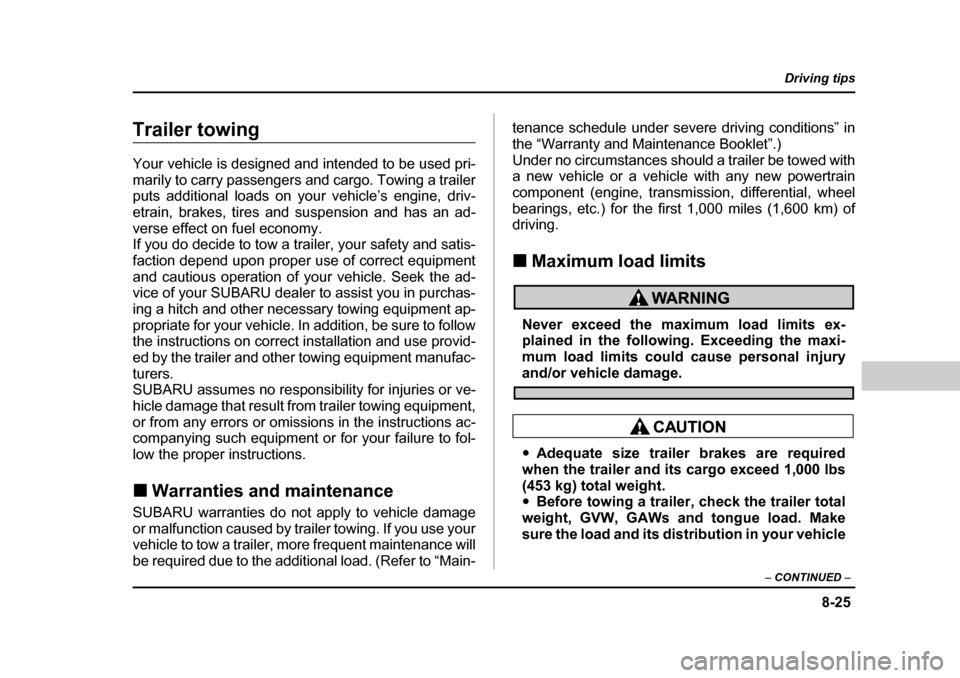
8-25
Driving tips
– CONTINUED –
Trailer towing
Your vehicle is designed and intended to be used pri-
marily to carry passengers and cargo. Towing a trailer
puts additional loads on your vehicle’s engine, driv-
etrain, brakes, tires and suspension and has an ad-
verse effect on fuel economy.
If you do decide to tow a trailer, your safety and satis-
faction depend upon proper use of correct equipment
and cautious operation of yo ur vehicle. Seek the ad-
vice of your SUBARU dealer to assist you in purchas-
ing a hitch and other necessary towing equipment ap-
propriate for your vehicle. In addition, be sure to follow
the instructions on correct installation and use provid-
ed by the trailer and other towing equipment manufac-
turers.
SUBARU assumes no responsibi lity for injuries or ve-
hicle damage that result from trailer towing equipment,
or from any errors or omissions in the instructions ac-
companying such equipment or for your failure to fol-
low the proper instructions. �„ Warranties and maintenance
SUBARU warranties do not apply to vehicle damage
or malfunction caused by trailer towing. If you use your
vehicle to tow a trailer, more frequent maintenance will
be required due to the additional load. (Refer to “Main- tenance schedule under severe driving conditions” in
the “Warranty and Maintenance Booklet”.)
Under no circumstances should a trailer be towed with
a new vehicle or a vehicle with any new powertrain
component (engine, transmis
sion, differential, wheel
bearings, etc.) for the first 1,000 miles (1,600 km) of
driving. �„ Maximum load limits
Never exceed the maximum load limits ex-
plained in the following. Exceeding the maxi-
mum load limits could cause personal injury
and/or vehicle damage.
�yAdequate size trailer brakes are required
when the trailer and its cargo exceed 1,000 lbs
(453 kg) total weight. �y Before towing a tr ailer, check the trailer total
weight, GVW, GAWs and tongue load. Make
sure the load and its dist ribution in your vehicle
Page 319 of 487
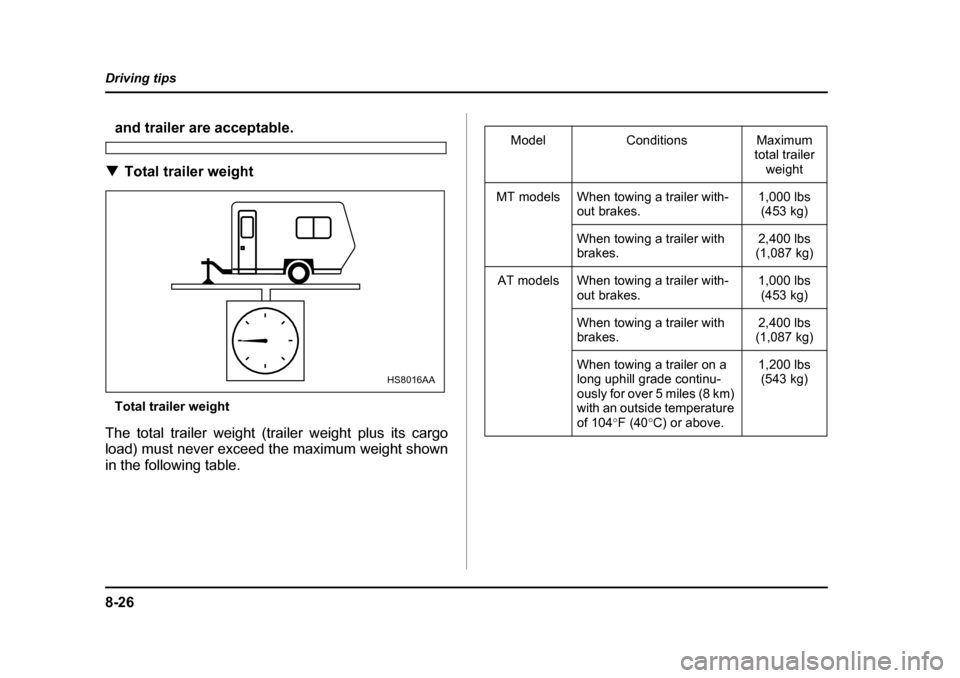
8-26
Driving tips
and trailer are acceptable.
�T Total trailer weight
Total trailer weight
The total trailer weight (trailer weight plus its cargo
load) must never exceed the maximum weight shown
in the following table.
HS8016AA
Model Conditions Maximum total trailer weight
MT models When towing a trailer with- out brakes. 1,000 lbs
(453 kg)
When towing a trailer with
brakes. 2,400 lbs
(1,087 kg)
AT models When towing a trailer with- out brakes. 1,000 lbs
(453 kg)
When towing a trailer with
brakes. 2,400 lbs
(1,087 kg)
When towing a trailer on a
long uphill grade continu-
ously for over 5 miles (8 km)
with an outside temperature
of 104 °F (40 °C) or above. 1,200 lbs
(543 kg)
Page 324 of 487
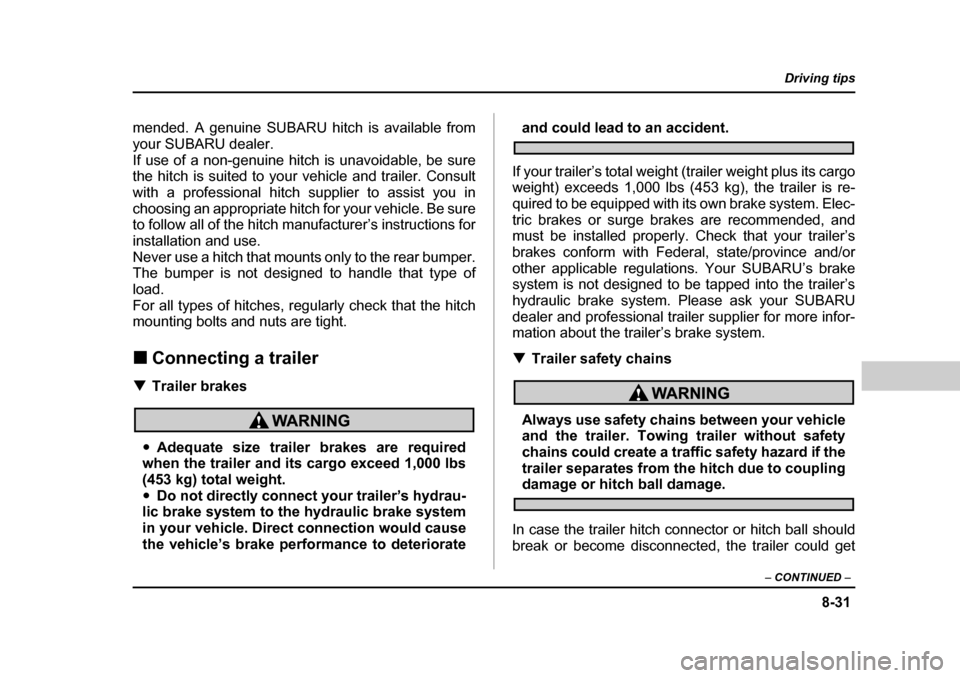
8-31
Driving tips
– CONTINUED –
mended. A genuine SUBARU hitch is available from
your SUBARU dealer.
If use of a non-genuine hitch is unavoidable, be sure
the hitch is suited to your vehicle and trailer. Consult
with a professional hitch supplier to assist you in
choosing an appropriate hitch for your vehicle. Be sure
to follow all of the hitch manufacturer’s instructions for
installation and use.
Never use a hitch that mounts only to the rear bumper.
The bumper is not designed to handle that type of
load.
For all types of hitches, r egularly check that the hitch
mounting bolts and nuts are tight. �„ Connecting a trailer
�T Trailer brakes
�yAdequate size trailer brakes are required
when the trailer and its cargo exceed 1,000 lbs
(453 kg) total weight.�y Do not directly connect your trailer’s hydrau-
lic brake system to the hydraulic brake system
in your vehicle. Direct connection would cause
the vehicle’s brake performance to deteriorate
and could lead to an accident.
If your trailer’s total weight (trailer weight plus its cargo
weight) exceeds 1,000 lbs (453 kg), the trailer is re-
quired to be equipped with its own brake system. Elec-
tric brakes or surge brakes are recommended, and
must be installed properly. Check that your trailer’s
brakes conform with Feder al, state/province and/or
other applicable regulations. Your SUBARU’s brake
system is not designed to be tapped into the trailer’s
hydraulic brake system. Please ask your SUBARU
dealer and professional trailer supplier for more infor-
mation about the trailer’s brake system. �T Trailer safety chains
Always use safety chains between your vehicle
and the trailer. Towing trailer without safety
chains could create a traffic safety hazard if the
trailer separates from th e hitch due to coupling
damage or hitch ball damage.
In case the trailer hitch connector or hitch ball should
break or become disconnect ed, the trailer could get
Page 328 of 487

8-35
Driving tips
– CONTINUED –
�yBacking up with a trailer is difficult and takes prac-
tice. When backing up with a trailer, never accelerate
or steer rapidly. When turning back, grip the bottom of
the steering wheel with one hand and turn it to the left
for a left turn, and turn it to the right for a right turn.
�y If the ABS warning li ght illuminates while the vehicle
is in motion, stop towing the trailer and have repairs
performed immediately by the nearest SUBARU deal-er. �T Driving on grades
�y Before going down a steep hill, slow down and shift
into lower gear (if necessary, use 1st gear) in order to
utilize the engine braking ef fect and prevent overheat-
ing of your vehicle’s brakes. Do not make sudden
downshifts.�y When driving uphill in hot weather, the air condition-
er may turn off automatically to protect the engine from
overheating.�y When driving uphill in hot weather, pay attention to
the water temperature gauge pointer (for all vehicles)
and AT OIL TEMP warning light (for AT vehicles) since
the engine and transmission are relatively prone to
overheating under these conditions. If the water tem-
perature gauge pointer approaches the OVERHEAT
zone or the AT OIL TEMP warning light illuminates,
immediately switch off the ai r conditioner and stop the
vehicle at the nearest safe place. Refer to the “Engine overheating” section in chapter 9, and “Warning and indicator lights” se
ction in chapter 3.
NOTE (Turbo models only)
In a vehicle that has an automatic transmission,
the engine is less likely to overheat with the “D”
range selected than it is with the manual mode se-
lected. �y If your vehicle has an autom atic transmission, avoid
using the accelerator pedal to stay stationary on an
uphill slope instead of using the parking brake or foot
brake. That may cause the transmission fluid to over-
heat. �y Non-turbo models only: If your vehicle has an auto-
matic transmission, place the selector lever as follows:
Uphill slopes: “D” position
Downhill slopes: A low-speed gear position to use en-
gine braking �T Parking on a grade
Always block the wheels under both vehicle and trailer
when parking. Apply the parking brake firmly. You
should not park on a hill or slope. But if parking on a
hill or slope cannot be avoided, you should take the
following steps:
1. Apply the brakes and hold the pedal down.
2. Have someone place wheel blocks under both the
Page 329 of 487

8-36
Driving tips
vehicle and trailer wheels.
3. When the wheel blocks are in place, release theregular brakes slowly until
the blocks absorb the load.
4. Apply the regular brakes and then apply the park-
ing brake; slowly release the regular brakes.
5. Shift into 1st or reverse gear (manual transmission)
or “P” (automatic transmission) and shut off the en-
gine.
Page 359 of 487
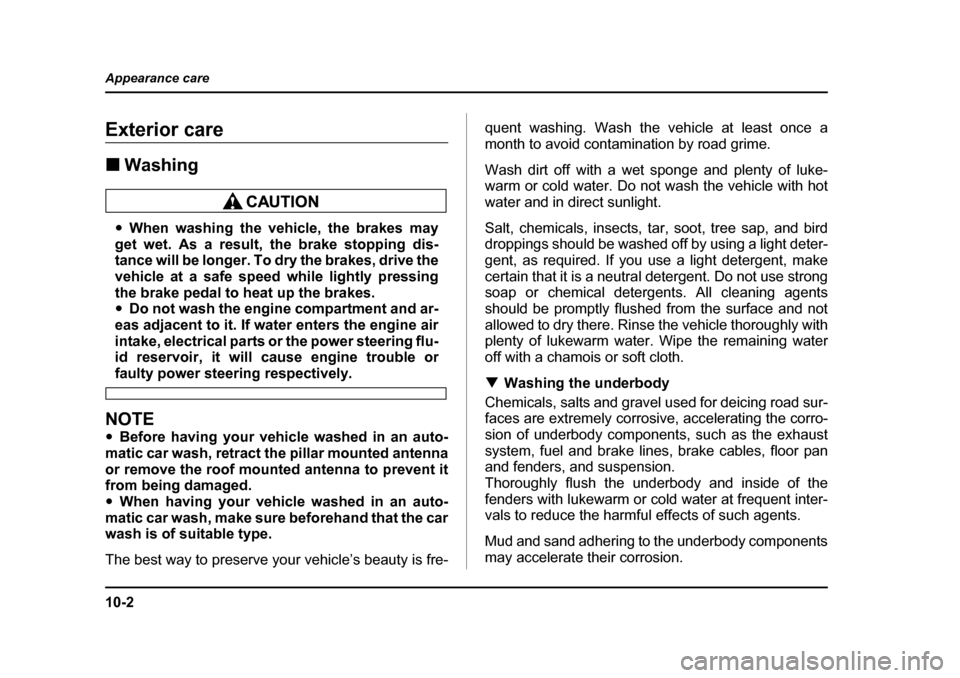
10-2
Appearance care
Appearance careExterior care �„
Washing
�yWhen washing the vehicle, the brakes may
get wet. As a result, the brake stopping dis-
tance will be longer. To dry the brakes, drive the
vehicle at a safe speed while lightly pressing
the brake pedal to heat up the brakes. �y Do not wash the engine compartment and ar-
eas adjacent to it. If water enters the engine air
intake, electrical parts or the power steering flu-
id reservoir, it will cause engine trouble or
faulty power steering respectively.
NOTE �y Before having your vehicle washed in an auto-
matic car wash, retract the pillar mounted antenna
or remove the roof mounted antenna to prevent it
from being damaged.�y When having your vehicle washed in an auto-
matic car wash, make sure beforehand that the car
wash is of suitable type.
The best way to preserve your vehicle’s beauty is fre- quent washing. Wash the vehicle at least once a
month to avoid contamination by road grime.
Wash dirt off with a wet sponge and plenty of luke-
warm or cold water. Do not wash the vehicle with hot
water and in direct sunlight.
Salt, chemicals, insects, tar, soot, tree sap, and bird
droppings should be washed of
f by using a light deter-
gent, as required. If you use a light detergent, make
certain that it is a neutra l detergent. Do not use strong
soap or chemical detergents. All cleaning agents
should be promptly flushed from the surface and not
allowed to dry there. Rinse the vehicle thoroughly with
plenty of lukewarm water. Wipe the remaining water
off with a chamois or soft cloth. �T Washing the underbody
Chemicals, salts and gravel used for deicing road sur-
faces are extremely corrosive , accelerating the corro-
sion of underbody components, such as the exhaust
system, fuel and br ake lines, brake cables, floor pan
and fenders, and suspension.
Thoroughly flush the underbody and inside of the
fenders with lukewarm or cold water at frequent inter-
vals to reduce the harmful effects of such agents.
Mud and sand adhering to the underbody components may accelerate their corrosion.
Page 471 of 487

13-14
Consumer information and Reporting safety defects
�„
Adverse safety consequences of over-
loading on handling and stopping and on tires
Overloading could affect vehicle handling, stop-
ping distance, vehicle and tire as shown in the
following. This could lead to an accident and
possibly result in severe personal injury. �y Vehicle stability will deteriorate.
�y Heavy and/or high-mounted loads could in-
crease the risk of rollover.�y Stopping distance will increase.
�y Brakes could overheat and fail.
�y Suspension, bearings, axles and other parts of
the body could break or experience accelerated
wear that will shorten vehicle life. �y Tires could fail.
�y Tread separation could occur.
�y Tire could separate from its rim.
�„ Steps for Determining Correct Load
Limit
1. Locate the statement “The combined weight
of occupants and carg o should never exceed
XXX pounds” on your vehicle’s placard. 2. Determine the combined weight of the driver
and passengers that will be riding in your vehicle.
3. Subtract the combined weight of the driver
and passengers from XXX kilograms or XXX
pounds.
4. The resulting figure equals the available
amount of cargo and luggage load capacity. For
example, if the “XXX” am
ount equals 1,400 lbs
(635 kg). and there will be five- 150 lbs (68 kg)
passengers in your vehicle, the amount of avail-
able cargo and luggage load capacity is 650 lbs.
(1,400 – 750 (5